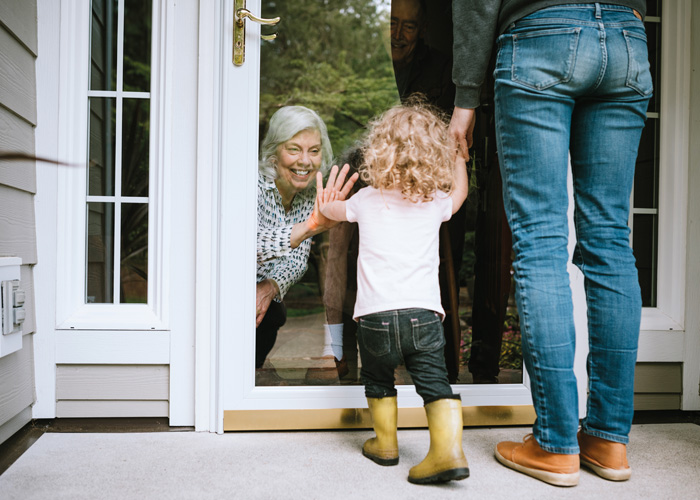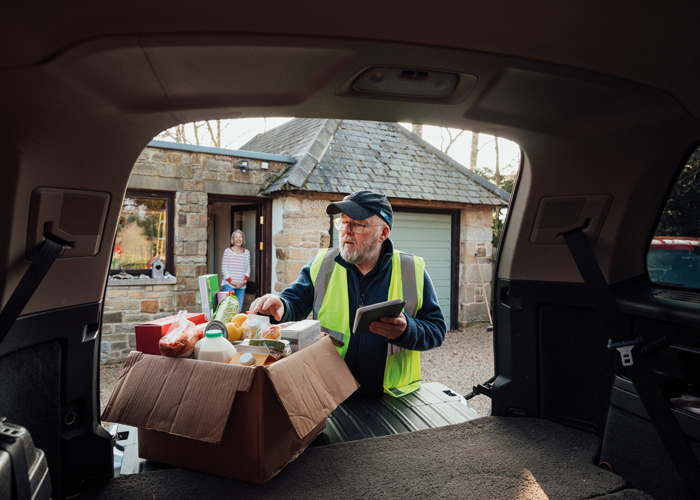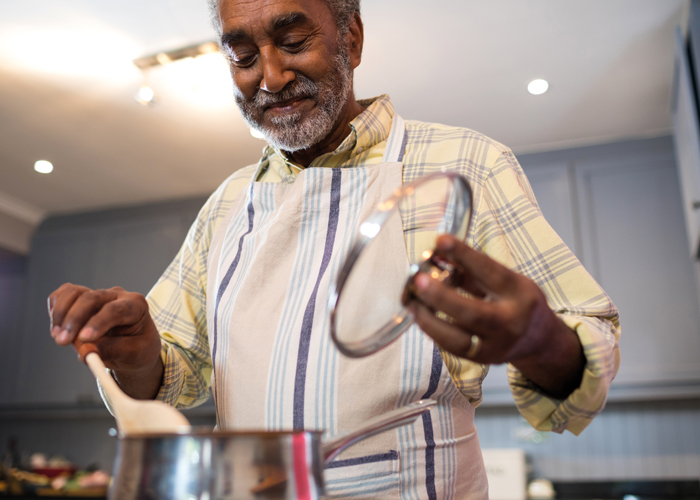Isolating loneliness
In Conditions
Follow this topic
Bookmark
Record learning outcomes
Shielding or self-isolating during the Covid-19 pandemic have exacerbated feelings of loneliness for many older people, but pharmacy can be on hand to offer support
During the Covid-19 pandemic, the over-70s have been advised to shield and be extra careful about following social distancing rules, even if they have no underlying health conditions. This is because most people who catch Covid-19 have mild or moderate symptoms, but data shows that the over-70s are more likely to develop complications.

While lockdown measures are being eased, some people in this age bracket may still be too anxious to venture out and about. In May 2020, Age UK’s research revealed that 6.4 million people aged 70 and over in the UK were worried about the effect that coronavirus is having on their life, with over two-fifths saying their mental health had been affected by the pandemic.
“For many people aged 70 and over, whether shielding or not, the lockdown will have been a time of increased loneliness and isolation, with significantly less social contact than normal,” says Simon Hewett-Avison, director of services at the charity Independent Age. “Many older people aren’t experienced internet users, and that may have complicated things like getting food delivered or arranging repeat prescriptions. There have also been reports of people with anxiety about accessing healthcare services when they needed to, and the impact on mental health.”
After the pandemic is over, there will still be over a million older people who say they always or often feel lonely
At-risk age group
Age is the single most important factor predicting the severity of Covid-19 symptoms, with the death rate rising significantly from the age of 75. Of the 33,841 deaths that occurred in March and April 2020 involving Covid-19 in England and Wales, 90.4 per cent had at least one pre-existing condition, with dementia and Alzheimer’s disease being the most common, followed by coronary heart disease.
As people get older, their immune system becomes less efficient, so they become more prone to infections and more likely to experience complications. Ageing can also cause parts of the immune system to overact, leading to inflammation and tissue damage. Certain chronic conditions, including obesity, high blood pressure, diabetes, coronary heart disease and some forms of dementia, have been linked to age-related inflammation. In the case of Covid-19, the immune system’s response seems to trigger severe inflammation, not just in the lungs, but in other parts of the body as well.
“While all older people are different, there is evidence that being older can increase the risk of severe implications from coronavirus,” says Caroline Abrahams, charity director at Age UK. “This is because as we get older our immune systems weaken, which makes us more vulnerable to infections. At the same time, older people are also more likely to be living with multiple long-term conditions, such as cardiovascular disease and COPD, which are known to increase people’s risk of severe impact from coronavirus.”

Social effects
Since the pandemic began, the demand for Age UK’s friendship services, which already support thousands of older people, has almost trebled. “Many older people have found that the things they used to spend their time doing – hobbies, social activities, meeting with friends and family – have been put on hold and, for many, their usual support network has had to stay away,” says Caroline. “Most of us have coped with these changes in our lives by moving to online forms of communication, but with 3.6 million people over the age of 70, and the majority of those over 75 never having used the internet, this isn’t an option for everyone. We know this is a tough time for many older people, particularly for those who are alone right now – through our Advice Line we are hearing from people who are feeling anxious, depressed and lonely.”
Many older people rely on carers or regular medical appointments not just for health support, but also for social contact. “There’s no doubt that the Covid-19 pandemic has had an impact on the wellbeing of elderly people in the community, particularly if they are living alone,” says Ben Ashton, director of Good Oaks Home Care. “Loved ones and family members are having to keep their distance and not visit, which can cause elderly people to feel isolated and cut off from the support that they normally rely on.”
Some older people have been too frightened to leave the house to buy essential supplies, but have also been unable to access supermarket deliveries or local delivery schemes. In May 2020, Age UK and the Malnutrition Task Force revealed that they were receiving a growing number of reports that older people have been going without the food and support they need to stay well during the pandemic. Becoming malnourished can have serious health implications for older people, increasing the risk of infection, worsening any existing long-term conditions and leading to a greater risk of falls.
Crucial support
For many older people, support from community pharmacies has been essential, especially with repeat prescriptions and medicine supplies. Tracey Thompson, non-pharmacist pharmacy manager at Sea Road Pharmacy in Sunderland, which is part of the Avicenna group, has been helping older customers who are shielding or self-isolating at home. “A lot of our customers are over 65. By the second week of lockdown, we were getting phone calls from customers to say they were too frightened to come in,” she explains. “We started to deliver prescriptions for free, increasing our deliveries by more than 50 per cent, and they were so grateful as some of the local [pharmacies] were charging for this service. We also printed leaflets asking if they wanted any other products with their deliveries, such as toiletries or over-the-counter medicines. Even now, we will often get a phone call asking how busy we are before a customer decides to come into the pharmacy. We make sure they realise nothing is a bother for us, putting our customers’ needs above our business needs.”
As well as providing a vital lifeline for getting their medicines, a pharmacy delivery service can also provide the pharmacy team with the opportunity to check how well older customers are coping. This includes whether they are able to get enough healthy food and that they are doing exercise, drinking enough water and have some way of keeping in touch with people. “Many people don’t realise that pharmacists are able to offer healthy lifestyle advice, as well as advice on medications, so now is a good time to let them know that you’re here for them,” says Simon Hewett-Avison, director of services at Independent Age. “Encourage customers to keep up with a routine every day, which should include some form of daily exercise, as this will help support their mental, as well as physical, health.”
Keeping well
As lockdown restrictions are lifted, many over-70s may still be worried about being in contact with other people, even family and friends. This can have a significant impact on their mental health, and older people who experience depression or anxiety often don’t seek the help they need.
According to psychologist Corinne Sweet, who works with the charity Independent Age, it’s important that older people talk to someone about their worries, whether this is a family member, friend or healthcare professional. “Keep in touch so they know someone is there for them when they need support, but don’t give up on them if they don’t contact you in return,” she says. “By talking to them about how they’re feeling, without leading them into any particular issue, you might find out that something is troubling them other than loneliness and the lockdown. Be dependable – a missed visit or phone call can be very disappointing for someone who doesn’t have much contact with others.”
Corinne says that everyone should be looking after their mental and physical health, now as much as ever. The pharmacy team can suggest these tips to older customers:
- Stick to a routine – structuring each day and week can help when the days seem endless
- Stay physically active – suggest simple exercises to do indoors if they can’t get out and about
- Stay mentally well – mindfulness, breathing and relaxation exercises can be found online, but keeping busy in other ways can help too
- Keep the mind active – take up a new hobby, research family history or put old photos into an album
- Try volunteering – sign up to be a telephone volunteer through a local charity
- Tune in to local radio to stay connected to what’s happening in the local area.
For many pharmacy customers, the feelings of loneliness and isolation won’t stop as lockdown restrictions are lifted. Many local areas created a volunteer network to support vulnerable people during the pandemic, and it is hoped that these will continue.
“After the pandemic is over, there will still be over a million older people who say they always or often feel lonely, just as there were before Covid-19, and these are the people that will continue to need ongoing support,” says Simon. “Charities such as Independent Age have a range of services to provide support for older people, from helping them feel more connected to dealing with more practical matters, such as managing long-term health conditions that could make getting out and about more difficult.”

What is old age?

According to Age UK’s Later Life in the United Kingdom 2019 report, older age refers to people aged 65 and above. However, there are no strict definitions of an ‘older’ person. Not everyone ages biologically in the same way, so someone aged 75 may be healthier than someone aged 60.
“Older people are a diverse group of people, and it is unacceptable for blanket policies to be applied on the basis of age alone,” says Caroline Abrahams, Age UK’s charity director. “At Age UK, we have come out strongly against unacceptable blanket policies which have emerged during the coronavirus pandemic, including suggestions that treatment would be withheld on the basis of age. More now than ever before, it is essential that older people are provided with the information they need to make their own decisions about their lives.”
The term ‘frailty’ is increasingly being used to describe an older person who needs extra care and support, rather than focusing on their age. The proportion of people living with frailty rises with increasing age from 6.5 per cent in those aged between 60 and 69 years to 65 per cent in those aged 90 plus.
